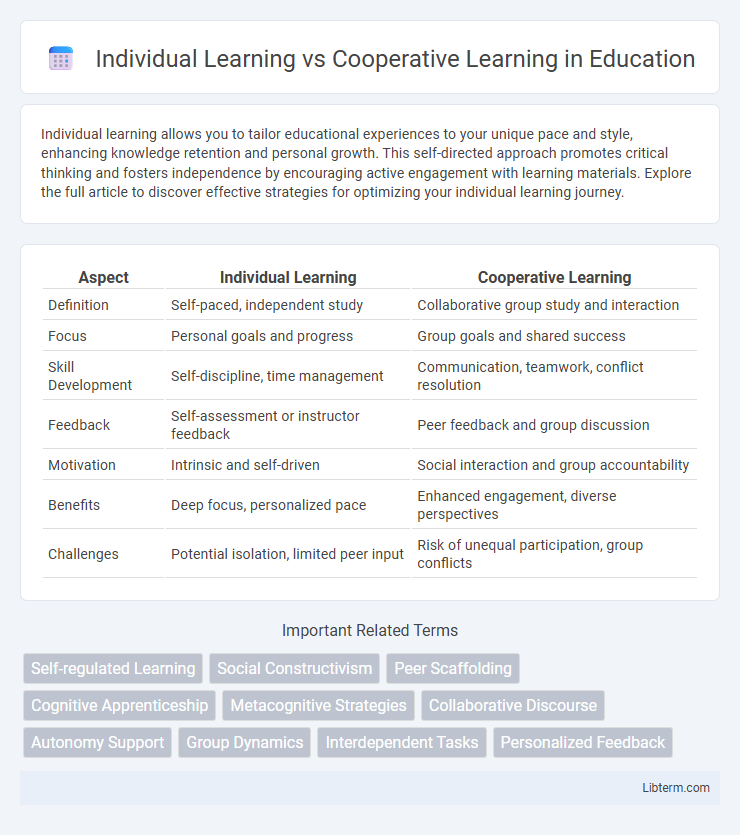Individual learning allows you to tailor educational experiences to your unique pace and style, enhancing knowledge retention and personal growth. This self-directed approach promotes critical thinking and fosters independence by encouraging active engagement with learning materials. Explore the full article to discover effective strategies for optimizing your individual learning journey.
Table of Comparison
| Aspect | Individual Learning | Cooperative Learning |
|---|---|---|
| Definition | Self-paced, independent study | Collaborative group study and interaction |
| Focus | Personal goals and progress | Group goals and shared success |
| Skill Development | Self-discipline, time management | Communication, teamwork, conflict resolution |
| Feedback | Self-assessment or instructor feedback | Peer feedback and group discussion |
| Motivation | Intrinsic and self-driven | Social interaction and group accountability |
| Benefits | Deep focus, personalized pace | Enhanced engagement, diverse perspectives |
| Challenges | Potential isolation, limited peer input | Risk of unequal participation, group conflicts |
Understanding Individual Learning
Individual learning emphasizes personal responsibility, allowing learners to process information at their own pace and develop critical thinking skills independently. This method enhances self-regulation, motivation, and personalized feedback tailored to unique learning styles. Research shows that individual learning fosters deeper comprehension and retention by encouraging focused attention and self-assessment strategies.
Exploring Cooperative Learning
Cooperative learning involves students working collaboratively in small groups to achieve shared educational goals, enhancing communication, problem-solving, and critical thinking skills. Research shows cooperative learning increases academic achievement, social skills, and motivation compared to individual learning, as peers support each other's understanding through interactive dialogue. Key strategies include structured group roles, positive interdependence, and frequent formative assessments to ensure active participation and accountability.
Key Differences Between Individual and Cooperative Learning
Individual learning emphasizes self-paced study and personal responsibility, allowing learners to focus deeply on specific topics without external influence. Cooperative learning involves group collaboration, fostering communication and teamwork skills while enabling shared problem-solving and diverse perspectives. Key differences include the level of social interaction, dependency on peers, and the development of interpersonal skills in cooperative settings versus the autonomy and self-motivation central to individual learning.
Advantages of Individual Learning
Individual learning enables tailored pace and focus, allowing learners to master concepts without external distractions and align studies with personal goals. It fosters deep concentration and self-discipline, leading to improved retention and critical thinking skills. This method also supports personalized feedback, enabling learners to identify and address specific weaknesses effectively.
Benefits of Cooperative Learning
Cooperative learning enhances critical thinking and problem-solving skills by encouraging students to engage in dialogue and diverse perspectives. It promotes social interaction, collaboration, and communication, leading to improved academic achievement and increased motivation. Studies show that cooperative learning fosters positive interdependence, accountability, and higher retention of information compared to individual learning models.
Challenges Faced in Individual Learning
Individual learning often encounters challenges such as limited motivation, lack of immediate feedback, and difficulty in maintaining focus without peer support. Students may struggle with self-discipline and time management, impacting the retention and application of knowledge. Isolation during solo study can hinder problem-solving abilities and reduce exposure to diverse perspectives.
Common Obstacles in Cooperative Learning
Common obstacles in cooperative learning include unequal participation, where some group members dominate while others remain passive, and conflicts arising from differing opinions or work styles. Communication breakdowns can hinder effective collaboration, reducing the overall learning outcomes compared to individual learning. Addressing these challenges requires clear role assignments, conflict resolution strategies, and fostering a positive group dynamic.
Impact on Student Motivation and Engagement
Individual learning allows students to progress at their own pace, fostering intrinsic motivation by enabling personalized goal-setting and self-reflection. Cooperative learning enhances engagement through social interaction, peer support, and shared accountability, which promotes collaborative skills and a sense of community. Research indicates that combining both approaches can optimize motivation by balancing autonomy with social connectedness in educational environments.
Choosing the Right Learning Approach
Choosing the right learning approach depends on the learner's goals, context, and preferences. Individual learning enhances self-paced mastery and personal accountability, ideal for tasks requiring deep focus and independent problem-solving. Cooperative learning fosters collaboration, communication skills, and diverse perspectives, making it effective for group projects, social interaction, and complex problem solving.
Integrating Individual and Cooperative Learning Strategies
Integrating individual and cooperative learning strategies enhances student engagement and knowledge retention by balancing personalized skill development with collaborative problem-solving. Research shows that combining self-paced individual tasks with group discussions fosters deeper understanding and critical thinking while promoting social interaction and communication skills. Effective educational models leverage technology and differentiated instruction to tailor learning experiences that meet diverse learner needs within both individual and cooperative frameworks.
Individual Learning Infographic

 libterm.com
libterm.com